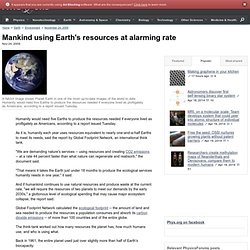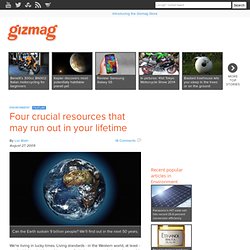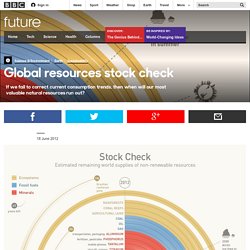

Mankind using Earth's resources at alarming rate. Humanity would need five Earths to produce the resources needed if everyone lived as profligately as Americans, according to a report issued Tuesday.

As it is, humanity each year uses resources equivalent to nearly one-and-a-half Earths to meet its needs, said the report by Global Footprint Network, an international think tank. "We are demanding nature's services -- using resources and creating CO2 emissions -- at a rate 44 percent faster than what nature can regenerate and reabsorb," the document said. "That means it takes the Earth just under 18 months to produce the ecological services humanity needs in one year," it said. And if humankind continues to use natural resources and produce waste at the current rate, "we will require the resources of two planets to meet our demands by the early 2030s," a gluttonous level of ecological spending that may cause major ecosystem collapse, the report said. Today, 80 percent of countries use more biocapacity than is available within their borders. Four crucial resources that may run out in your lifetime.
We're living in lucky times.

Living standards - in the Western world, at least - are the highest in history. It's an era of relative peace and plenty that would amaze our ancestors. But it's not going to continue forever; we're already stretching many of our natural resources to their limits, and the world's population will jump from 6.5 billion to around 9 billion over the next 50 years. Get ready for a painful correction - here are four interconnected resources that are headed for a catastrophic squeeze within our lifetime.
Oil The modern world is built on oil. The Peak Oil theory, if you haven't already encountered it, suggests that oil production for a given reserve will follow a bell curve. It's a theory backed by the vast majority of scientists and energy economists, such as the International Energy Agency. On the rebuttal side, there are people promoting the idea that oil isn't a fossil fuel, created by dead biomass buried beneath the Earth's surface. Food As we learned from Dr. Science & Environment - Global resources stock check. As the world’s population soars, so does its consumption, and as a result we are stretching many of our natural resources to their limits.

Of course, the assumption is that human ingenuity and market forces will prevent supplies from running out: we could create better or cheaper extraction methods, recycle materials, find alternatives to non-renewable sources, or reduce consumption. The hope is that talks at the Rio+20 Earth summit will help to steer the world economy on a more sustainable path. But the clock is already ticking, and if the unthinkable happens and we fail to correct current trends, then when can we expect our most valuable resources to run out? If you want to see the data we used to construct this infographic, you can find it here [PDF]. (Most computers will open PDF documents automatically, but you may need Adobe Reader, download the reader here) How Much Is Left? The Limits of Earth's Resources, Made Interactive.